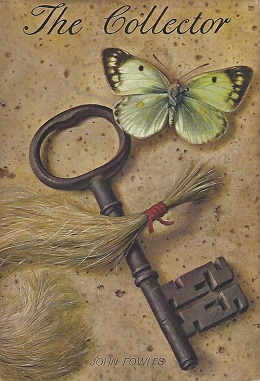In postwar England, Frederick Clegg, an unassuming, socially awkward clerk becomes obsessed with Miranda Grey, a beautiful young art student. He is too shy to approach her and instead watches her from afar and collects butterflies. Once Clegg wins a large sum of money betting on soccer, however, he decides to purchase a large country estate and kidnap Miranda under the belief that she will love him once she gets to know him. Nothing goes as planned for either captor or captive.
An unfortunate favorite of several notorious serial killers, John Fowles 1963 debut novel deserves to be something more than notorious. To start with, there are some interesting – if somewhat superficial – commonalities between The Collector and Nabokov’s Lolita. Both feature as their (quite unreliable) narrators deranged men who are obsessed with young women. But unlike the latter, the former gives a voice to its victim. Half of the book takes the form of Miranda’s diary, in which she pines for freedom, shares her disgust (and occasional pity) for Clegg, gushes over a fellow artist twice her age, and shares her contempt for everything bourgeoisie and inauthentic. Interestingly, she comes across as every bit as unsympathetic as Clegg: she’s vain, condescending, (perhaps justifiably) cruel, and hypocritical.
Despite the bulk of the interaction taking place between just two characters, Fowles intended this novel to be social commentary, a critique of prosperity. The working class (as represented by Clegg), he argued, was getting money and power before it knew how to utilize either responsibly. Even if you find this view a tad insulting – and I do – there is something amusing about the juxtaposition of Clegg’s (old fashioned, uncultured, and isolated) aesthetic and moral opinions with Miranda’s (a sharp-minded proto-hippie of sorts).
Whether it’s the association with serial killers, the chilling downer ending (an asset, in my view), the by-now familiar plot, or just its datedness, The Collector is easy to write off as damaged goods. But it shouldn’t be. Watching these two characters find new ways to drive each other crazy makes this book well worth the read.
8

No comments:
Post a Comment